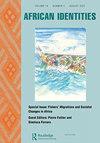Online learning: experiences of Namibian students relying on smartphones
Q1 Social Sciences
引用次数: 0
Abstract
ABSTRACTThis study reports on the experiences of a group of university students relying on smartphones to access online learning during/post COVID-19. In understanding the effectiveness of smartphones Rogers Diffusion of Innovation theory was consulted. The study took place at a University in Namibia at the Faculty of Education. This study adhered to a mixed methodology approach favoured by the paradigm. One hundred students participated in the study recruited through convenience sampling method. The data was collected using a questionnaire containing questions for both qualitative and quantitative data. The study employed content analysis techniques to analyse the qualitative data and statistical software to analyse the quantitative data. The findings present the following factors: opportunities, restrictions and possible solutions for students relying on smartphones for online learning. The study made recommendations for effective online learning which include affordable data packages, provision of suitable smart devices and the need for stable internet connections to all students. The study reveals that smartphones in Namibia have become a necessity to many students to access education during/post COVID-19 era.KEYWORDS: Online learningm-learningsmartphonesdiffusion of innovation theory Disclosure statementNo potential conflict of interest was reported by the author(s).Additional informationNotes on contributorsReginald Gerald GovenderReginald Gerald Govender is a Lecturer: Computer Science Education at the University of KwaZulu-Natal, South Africa. He coordinates several Computer Science Education modules dealing with coding and robotics, teaches and supervises postgraduate research in computer programming, educational robotics, ICTs and Mathematics. He has published in local and international journals.Simon AlbinSimon Albin is a Lecturer: Mathematics Education in the School of Education, Department of Early Childhood Education and Care at the University of Namibia. His roles include lecturing Mathematics and Numeracy Studies and supervising research projects for undergraduate students in the B.Ed Honours programme. Simon’s research interests are intervention research, teaching practice, mathematics proficiency of fractions and educational technology.在线学习:纳米比亚学生依赖智能手机的体验
摘要本研究报告了一群大学生在新冠肺炎疫情期间依靠智能手机上网学习的经历。在理解智能手机的有效性时,参考了罗杰斯的创新扩散理论。这项研究是在纳米比亚一所大学的教育学院进行的。本研究采用了范式所支持的混合方法。本研究采用方便抽样的方法招募了100名学生。数据是通过一份包含定性和定量数据问题的问卷收集的。本研究采用内容分析技术对定性数据进行分析,采用统计软件对定量数据进行分析。研究结果显示了以下因素:依赖智能手机进行在线学习的学生的机会、限制和可能的解决方案。该研究为有效的在线学习提出了建议,包括负担得起的数据包,提供合适的智能设备,以及为所有学生提供稳定的互联网连接。研究显示,在纳米比亚,智能手机已成为许多学生在COVID-19后时代接受教育的必需品。关键词:在线学习智能手机创新扩散理论披露声明作者未报告潜在利益冲突。其他信息贡献者说明reginald Gerald Govender reginald Gerald Govender是南非夸祖鲁-纳塔尔大学的讲师:计算机科学教育。他协调了几个计算机科学教育模块,涉及编码和机器人技术,教授和监督计算机编程,教育机器人,信息通信技术和数学的研究生研究。他曾在本地和国际期刊上发表文章。Simon Albin,纳米比亚大学幼儿教育与护理系教育学院数学教育讲师。他的职责包括讲授数学和算术研究,并指导学士学位荣誉课程的本科生研究项目。主要研究方向为干预研究、教学实践、分数数学熟练程度和教育技术。
本文章由计算机程序翻译,如有差异,请以英文原文为准。
求助全文
约1分钟内获得全文
求助全文

 求助内容:
求助内容: 应助结果提醒方式:
应助结果提醒方式:


